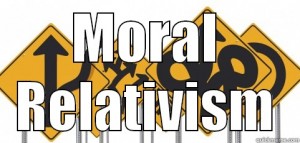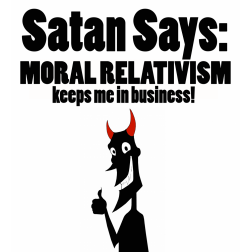 In a recent article, Relativism and the Redefining of Tolerance, I highlighted both relativism and its impact on and redefining of the definition and concept of tolerance. In this brief article, I want to highlight the findings of a recent Barna survey, The End of Absolutes: America’s New Moral Code, which shows how over the last 60 years relativism, along with its cohorts–scientism, material naturalism, humanism, and hedonism–have formed a new moral code for the majority of its populace:
In a recent article, Relativism and the Redefining of Tolerance, I highlighted both relativism and its impact on and redefining of the definition and concept of tolerance. In this brief article, I want to highlight the findings of a recent Barna survey, The End of Absolutes: America’s New Moral Code, which shows how over the last 60 years relativism, along with its cohorts–scientism, material naturalism, humanism, and hedonism–have formed a new moral code for the majority of its populace:
Using the statistics above, let’s break down the progression of relativism and the breakdown of moral absolutes within the U.S. (and Western society in general) over the last 60 years. In response to the statement, ‘moral truth is relative,’ this poll indicated a steady increase in the affirmative for a relativistic worldview:
Boomers-born during the post–World War II baby boom, approximately between the years 1946 and 1964-41%
Gen-Xers-born in the 1960s and 1970s-44%
Millennials-a person reaching young adulthood around the year 2000-51%
I found the first sentence to be illuminating, “Two-thirds of American adults either believe moral truth is relative to circumstances (44%) or have not given it much thought (21%)“. If one-fifth of the population has fallen into such an apathetic state of non-reflection and unconcern in regards to where morality fits within their worldview, not to mention that of their society/culture, it is not surprising that relativism has steadily overtaken an objective moral worldview such as is found in Christianity.
However, the fact is that almost no one is that apathetic when confronted with the serious questions of objective moral values, as philosopher Paul Copan illustrates:
The apostle Paul gave the following exposé of relativism (i.e. rejection of objective moral truth claims) 2,000 years ago:
 The suppression of truth which Paul refers too, has been alive and thriving throughout the past millenia, ever since the author of relativism, Satan, presented his relativistic ideology to Eve: “did God actually say?” (Gen. 3:1) Paul not only exposes the relativistic ideology, but the reason for it: “For although they knew God, they did not honor him as God or give thanks to him, but they became futile in their thinking, and their foolish hearts were darkened.” When a person, or a society/culture becomes disconnected from God, who is the source of all moral goodness, the alternative of choice in Western countries has proved to be: relativism.
The suppression of truth which Paul refers too, has been alive and thriving throughout the past millenia, ever since the author of relativism, Satan, presented his relativistic ideology to Eve: “did God actually say?” (Gen. 3:1) Paul not only exposes the relativistic ideology, but the reason for it: “For although they knew God, they did not honor him as God or give thanks to him, but they became futile in their thinking, and their foolish hearts were darkened.” When a person, or a society/culture becomes disconnected from God, who is the source of all moral goodness, the alternative of choice in Western countries has proved to be: relativism.
Some may object to the claim that God is the source of all moral goodness and that objective moral values are rooted in His very nature. However, when one compares the theistic worldview with that of the naturalistic worldview, it soon becomes clear that the theistic worldview is not only more plausible, but it also makes better sense of the world in which we live. Again, Paul Copan offers the following analogy on the topic:
If God existed, we would certainly expect objective moral values to exist. Such values would not be surprising or unnatural at all. After all, if we humans have been made to resemble God in certain important respects, if we have been created in the “image” of a personal, good God (as traditional theism affirms), then we should not wonder that each of us has intrinsic dignity and worth, that we are morally responsible agents, that we have the capacity to recognize moral truths, and that we have certain moral obligations. It should, further, be noted that morality relates only to persons–not to rocks or non-personal entities like ants, rats, or chimps, which are not morally responsible and have no moral obligation. But if God does not exist, then we can rightly ask: “How does objective morality emerge from non-moral processes? If God does not exist, on what basis should I think that I have intrinsic dignity and worth? How does one account for this emergence of dignity if nature is all there is? If there are moral laws to the universe, then why think that they have to do only with us humans and not other living organisms?”
Of course, people can be atheists or non-theists (i.e., who do not believe in a personal God) and still share the same moral values as theists (who believe in a personal God). Furthermore, they can develop moral systems which assert the same kinds of values that the theist affirms. This is not surprising since atheists too have been made in the image of a good God–even though they do not acknowledge this. So the issue to face is not, “Do I recognize certain moral values to be objectively true?” Rather, it is, “If I recognize these moral values to be true, which viewpoint offers the best foundation for these moral values? Is it the viewpoint which presupposes an impersonal, non-moral, unguided series of steps in a long naturalistic process? Or is it a viewpoint which presupposes a personal, good Creator and Designer, who has made us to relate personally to him and to live our lives according to the pattern which reflects his moral character (theism)? It seems clear that theism, which is supernaturalistic (there is a reality beyond nature), offers a more plausible picture for affirming these values than does a naturalistic one. So we have seen that moral relativism is rationally indefensible and practically unlivable. Furthermore, if we do affirm objective moral values and intrinsic human dignity, a theistic context helps us make better sense of these moral facts than does an atheistic or non-theistic one.[2]
It is our duty as Christians to equip ourselves as Christian case-makers so we are prepared to confront relativism (the decline of objective moral values) via presenting these serious questions in conversations with our friends, family, colleagues, acquaintances. In doing so we will be ‘flipping the switch’ within their unreflective minds and helping to wake them up to the need of seriously considering their stance on objective moral values, as well as a number of other unsubstantiated stances/positions they may be holding to within their worldview. Remember, every worldview has to answer four questions: 1) What are our origins? 2) What is the purpose and meaning of life-why am I here? 3) Morality-how do we decide as to what is right and what is wrong; how do we differentiate between what is good and what is evil? 4) Ultimate destiny-when I die, what is my destination? These are the questions that we, as Christians, need to be asking of those the Lord brings across our path.
I invite you to take an insightful and instructive journey on the topic via the following videos. I believe you will be strengthened in your convictions in proclaiming “the Way, the Truth and the Life,” (John 14:6) to those who are awash in the sea of relativism of our age.
Are Morals the Result of Social Conditioning?-William Lane Craig
What’s The Best Explanation For Moral Laws?-J. Warner Wallace
Where do Objective Morals Originate in the Universe?-William Lane Craig
What is Moral Relativism-Steven Garofalo-One Minute Apologist
If you are committed to working on becoming equipped as a Christian case-maker, I highly recommend Greg Koukl’s books, Tactics-A Game Plan for Discussing Your Christian Convictions, and The Story of Reality-How the world began, how it ends, and everything important that happens in between.
See also the following related articles:
True for you, but not for me…but can that be true?, here
Christian Theism & Material Naturalism-can they both be true?, here
References:
[1] Paul Copan, Is Everything Really Relative?-Examining the Assumptions of Relativism and the Culture of Truth Decay, Published by RZIM, 1999, pg. 33-34
[2] Ibid, pg.35-36
